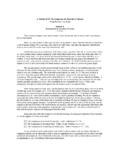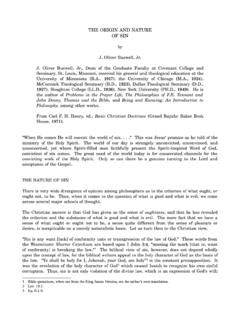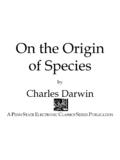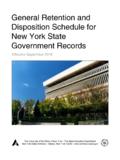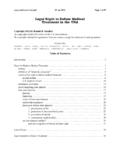Transcription of kim critique npp - Upper Register
1 Seyoon Kim s critique of the New Perspective on Paul Lee Irons In 2002, Seyoon Kim, Professor of New Testament at Fuller Theological Seminary, published Paul and the New This volume contains three inter-related themes: First, Kim defends and refines his thesis originally articulated in his 1977 dissertation2 that Paul developed his Christology and soteriology within a short period of time by reflecting on the Damascus Christophany in light of Scripture (and, Kim would now add, in light of the Jesus tradition). Second, in the process of defending and refining this thesis, Kim offers an incisive critique of the New Perspective on Paul (NPP), particularly as articulated and defended by James D.
2 G. Dunn. Third, as mentioned under point one, Kim now wants to add another factor in the origin of Paul s theology. Paul developed his theology, not only from his Damascus experience interpreted in light of Scripture, but also in dependence on the Jesus tradition, that is, the traditions handed down in the early church concerning the words and deeds of Jesus. The first two themes are interwoven in just about every chapter in the book. The third theme is less prominent, although it makes an important appearance in the latter half of 1 Seyoon Kim, Paul and the New Perspective: Second Thoughts on the Origin of Paul s Gospel (T bingen: Mohr-Siebeck; Grand Rapids: Eerdmans, 2002).
3 2 Seyoon Kim, The Origin of Paul s Gospel (WUNT 2/4; T bingen: Mohr-Siebeck, 1981; Grand Rapids: Eerdmans, 1982; 2nd ed. T bingen: Mohr-Siebeck, 1984). Seyoon Kim s critique of the New Perspective Page 2 2007 Lee Irons chapter five and is the explicit focus of chapter In this summary, I will be focusing on Kim s critique of the NPP, although his thesis about the Damascus origin of Paul s theology will also be dealt with, since it plays an important role in Kim s critique of the NPP. My goal here is primarily to provide an objective summary of his arguments, although I will also offer a brief evaluation at the end. Kim sees five areas where the NPP falls short.
4 (1) Paul s conversion/call Dunn claims that the doctrine of justification was a polemical doctrine that Paul developed 15 to 17 years after his conversion in the wake of the Antioch incident in order to defend the right of the Gentiles to be included in the people of Against this Kim presents an array of arguments to the show that Paul developed his doctrine of justification early as a direct inference from the Damascus Christophany. First, Kim argues (pp. 10-13) that the revelation of the gospel to Paul and his commission to be an apostle to the gentiles were inseparably bound up together. He appeals to Gal. 1:15-16 where Paul says, God, who .. called me through his grace, was pleased to reveal his Son to me so that I might preach (euangelizomai) him among the gentiles.
5 To be sure, Paul was sent to preach among the gentiles. But what he was sent to preach was not that the gentiles are now included, but a gospel message centered on God s Son. Dunn 3 Chapter eight is a reprint of Kim s article, Jesus, Sayings of in the Dictionary of Paul and His Letters (eds. Gerald F. Hawthorne, Ralph P. Martin, and Daniel G. Reid; Downers Grove, Ill.: InterVarsity, 1993), 474-92. 4 James D. G. Dunn, A Light to the Gentiles , or The End of the Law ? The Significance of the Damascus Road Christophany for Paul, in Jesus, Paul, and the Law: Studies in Mark and Galatians (Louisville: Westminster/John Knox, 1990), 89-107.
6 Seyoon Kim s critique of the New Perspective Page 3 2007 Lee Irons arbitrarily separates among the gentiles from to reveal his Son to me so that I might preach him and puts all the stress on the former while virtually ignoring the latter. Now Dunn does not totally eliminate the gospel content of Paul s call and Kim acknowledges this. However, in Kim s view, Dunn s understanding of the gospel that he received through the Damascus event is very limited. Dunn thinks that when Paul saw the same Jesus who had died under a curse now raised and exalted, he drew the conclusion that God favors the outcast, that is, the Gentile, since Jesus accursed death was tantamount to his becoming an outcast, or a Gentile.
7 Dunn appeals to Gal 3:13 in support of this reading. Kim critiques (pp. 20-21) this interpretation by pointing out that it implies that Christ was crucified for Gentiles only. But what kind of Messiah would Jesus be if he did not benefit Israel? If Jesus died only to show that God is in favor of the outcast or the Gentile, are the Jews already recipients of God s grace merely by being included in the Jewish covenant? This appears to support the two-covenant theory that Dunn claims to reject. Dunn s very limited understanding of the gospel that was revealed to Paul on the Damascus road leads him to deny that Paul reevaluated the law in light of the Damascus experience.
8 But Kim thinks Paul did reevaluate the law, and that this reevaluation was bound up with and central to the gospel that he received in the Damascus event. Before his conversion to faith in Christ, Paul had viewed the law as the means of salvation. But seeing the same Jesus who had been crucified under the curse of the law now exalted and vindicated by God caused him to rethink the role of the law. He now saw that salvation was not through his efforts at keeping the law but only through faith in Christ. Seeing Jesus crucified under the curse of the law appearing as the Messiah and Lord vindicated by God on the Damascus road, Paul realized that Christ s death was indeed the eschatological Seyoon Kim s critique of the New Perspective Page 4 2007 Lee Irons atonement for us and therefore that Christ was the end of the law for salvation (Rom 10:4) (p.)
9 22). In order to explain why Paul radically reevaluated the role of the law, Kim appeals to a key piece of biographical background, namely, Paul s pre-Christian Pharisaic zeal for the Law (Gal 1:13-14, 23; Phil 3:4-6). Kim appeals to Paul s former zeal for the law in order to push the origin of Paul s reevaluation of the law back to his call/conversion and its immediate aftermath. Kim says, It is not credible that Paul who was going to Damascus in order to persecute the Hellenists5 precisely for ignoring circumcision in their mission to the gentiles decided to join in their mission without any consciousness of the issue of circumcision (p. 29). How could Paul, who was formerly so zealous for the law, be converted to faith in Christ without immediately asking about the place of that law for which he was formerly so zealous?
10 To imagine that he did not immediately wonder about the role of the law in his newfound Christian faith would be to turn this genuine event of conversion into something like a modern-day car accident that resulted in Paul s partial memory loss (p. 29). Ironically, Dunn also attaches great significance to Paul s zealotic background. But he does so in order to advance his thesis that Paul s call involved a shift from being zealous for Israel s exclusivity and boundary markers, to welcoming the gentiles into the people of God. But the problem is, Dunn only attaches significance to Paul s zealotic background up to the moment of the Damascus event only to refuse to consider it as a factor in the 5 The Hellenists were Greek-speaking Jewish Christians, mentioned by Luke in Acts 6:1.
